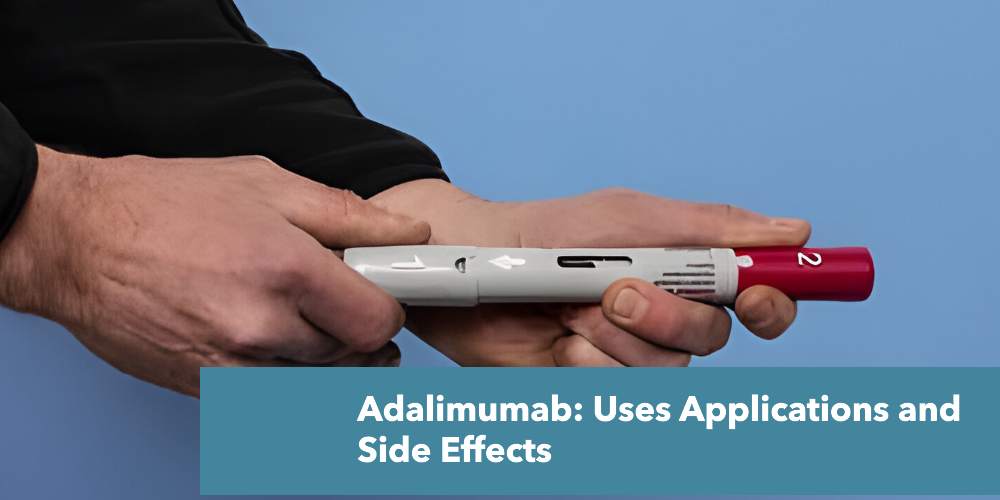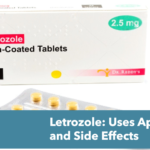What is a Adalimumab?
Adalimumab, often sold under the brand name Humira, is a prescription medication used to treat a variety of inflammatory conditions.
Conditions Treated: Adalimumab targets a wide range of inflammatory diseases, including rheumatoid arthritis, Crohn’s disease, ankylosing spondylitis, and psoriasis. It can also be used for juvenile arthritis, ulcerative colitis, and certain eye conditions.
Delivery Method: Adalimumab is administered as a subcutaneous injection, typically under the skin.
Approval and Use: Adalimumab was approved for medical use in the United States in 2002 and is considered an essential medicine by the World Health Organization. It’s a widely prescribed medication, demonstrating its effectiveness in treating various inflammatory conditions.
How Does Adalimumab Work?
Adalimumab is a medication designed to target inflammation in autoimmune diseases. Let’s explore how it works:
- Targeting a Specific Protein: Adalimumab belongs to a group of drugs called monoclonal antibodies. These antibodies are like custom-made molecules that can target specific substances in the body. In this case, Adalimumab targets a protein called tumor necrosis factor (TNF).
- Understanding TNF: TNF plays a role in regulating the immune system. However, in autoimmune diseases, the body can overproduce TNF, leading to inflammation and tissue damage.
- Neutralizing TNF: Adalimumab acts by attaching itself to TNF molecules, effectively neutralizing them. This prevents TNF from contributing to the immune system’s attack on healthy tissues.
- Reduced Inflammation: By blocking TNF, Adalimumab helps to reduce inflammation, which can alleviate symptoms and slow down disease progression.
Here’s a simpler way to think about it: Imagine TNF as a messenger that tells the immune system to attack. Adalimumab intercepts these messages, preventing the immune system from causing inflammation and damage.
Delivery and Effects:
- Adalimumab is typically given as an injection under the skin (subcutaneous injection).
- Once injected, it enters the bloodstream and seeks out TNF molecules to bind to and neutralize.
- This process helps to regulate the immune system and provides relief from symptoms associated with autoimmune diseases.
How to Use Adalimumab tablet?

Adalimumab is a powerful medication, but it’s not administered as a tablet. It’s a subcutaneous injection, meaning it’s given under the skin. Here’s a breakdown of what you need to know about using Adalimumab:
How it’s Given:
- Adalimumab comes in single-use prefilled syringes, pens, or vials.
- Each one is intended for a single injection don’t reuse them even if there’s leftover solution.
Before Your Injection:
- Double-check: Make sure the medication isn’t frozen or expired. Verify the solution looks clear and colorless, as instructed in the leaflet.
- Injection Site: You can inject into your thighs or stomach, avoiding the navel and surrounding area (2 inches). Each injection site should be at least 1 inch away from the previous one.
- Temperature: If refrigerated, let the solution reach room temperature (up to 25°C or 77°F) for 15-30 minutes before use. Never use heat to speed this up.
- Inform Your Doctor: Tell your doctor about any allergies to Adalimumab or signs of infection (fever, chills, cough).
What are the Side Effects of Adalimumab?
The most common side effects of adalimumab are injection site reactions. Other common side effects include abdominal pain, nausea, headaches, fatigue and joint pain.
Mild nose, throat or sinus infections may also occur. Drinking plenty of water and resting can help relieve these symptoms.
More serious side effects require immediate medical attention. These include:
Signs of an allergic reaction (such as rashes, swollen face, hands and feet, trouble breathing or swallowing, etc.)
- Persistent fever, bruising or bleeding
- Fatigue, cough or flu-like symptoms
- Shortness of breath
- Swollen ankles or feet or sudden weight gain (signs of heart failure)
- Blood in stool or changes in bowel habits
- Bloody or cloudy urine
- Mole that leaks fluid or bleeds
- Unexplained bruising or bleeding
- Liver problems (such as jaundice, lack of appetite or stomach pain)
- New or worsening skin problems
- Numbness or tingling in the arms, legs or face
- Vision changes
Unexplained symptoms these could be signs of autoimmune conditions
Adalimumab increases the risk of serious infections that may lead to hospitalization or death, including tuberculosis (TB), bacterial sepsis, invasive fungal infections and viral infections. Patients have also reported skin reactions, including new or worsening psoriasis.
Some Side Effects only Occur in Rare Cases:
- Worsening or new-onset congestive heart failure
- Autoimmune conditions, including lupus-like syndrome
- Nervous system problems (such as demyelinating disorders)
- Blood disorders
- Cancer, including lymphoma and leukemia
What are the Warning and Precautions of the Adalimumab?

Adalimumab can be a very effective medication, but it’s important to be aware of some potential risks and precautions before using it. We’ll discuss these together to make sure it’s the right choice for you.
Increased Risk of Infection: Adalimumab can weaken your immune system, making you more susceptible to infections. Tell us right away if you experience any signs of infection, such as fever, chills, or cough. We may also test you for tuberculosis (TB) before you start taking this medication.
Allergic Reactions: There’s a rare chance of a serious allergic reaction to adalimumab. Seek immediate medical attention if you experience swelling of the face, mouth, or throat, difficulty breathing, or a fast or irregular heartbeat.
Increased Risk of Cancer: Adalimumab has been linked to an increased risk of certain cancers, especially in children and young adults. Let us know if you develop any lumps or experience night sweats, unexplained weight loss, or fever.
General Precautions:
- Avoid using adalimumab if you have any active infections.
- Adalimumab may affect some lab tests. Keep attending all scheduled appointments to monitor your health.
- Adalimumab is not recommended during pregnancy or breastfeeding. We can discuss alternative treatment options if you’re considering getting pregnant or breastfeeding.
- Use caution if you have heart failure or nerve disorders. Tell us about any heart problems or nerve conditions you have.
- Minimize contact with people who have viral infections.
- Avoid live vaccines while using adalimumab. We can advise you on appropriate vaccinations.
By working together and understanding these potential risks, we can determine if adalimumab is the safest and most effective course of treatment for you.
How Does Adalimumab Interact with Other Medicines?
Adalimumab can be a powerful tool for managing your condition, but it’s important to understand how it interacts with other medications you might be taking.
Increased Risk of Infections and Cancers: Adalimumab can weaken your immune system, making you more susceptible to infections and potentially increasing the risk of certain cancers. We’ll discuss this further to ensure it’s the right medication for you.
Medications to Avoid: Some medications can worsen the effects of adalimumab, particularly by further suppressing your immune system. Let us know if you’re taking any of the following medications before you start adalimumab.
- Other TNF-alpha blockers (e.g., certolizumab pegol, etanercept)
- Medications that weaken the immune system (e.g., abatacept, anakinra)
Medications to Discuss with Your Doctor: There are other medications that may interact with adalimumab, although not all interactions are fully understood. We recommend reviewing this list together to see if any are relevant to you:
- [List of medications] (This is not an exhaustive list)
Alternative Medications and Timing: In some cases, your doctor may recommend using certain medications alternately with adalimumab, or finding alternative medications altogether. We’ll work together to find the safest and most effective treatment plan for you.
By openly communicating about all your medications, we can minimize the risk of interactions and ensure adalimumab works effectively for you.
What happens if I miss a dose of Adalimumab?
If you forget to give yourself an injection of adalimumab, you should inject the missed dose as soon as you remember, then resume your normal dosing schedule.
However, if it’s almost time for your next scheduled dose, simply skip the missed dose and continue as normal. Do not double up on your dose to make up for a missed one.
What happens if I overdose on Adalimumab?
If you think you or someone you know has overdosed on adalimumab, call your local poison control center or emergency medical services immediately. Don’t wait for symptoms to appear.
Here’s some additional information to keep in mind:
- Adalimumab comes in prefilled syringes with specific dosage amounts for different conditions. The Doctor will carefully determine the right dosage for you to minimize the risk of any complications.
- Typical doses range from 10mg to 160mg injected under the skin (subcutaneously) every other week, although some conditions may require weekly injections. Doctor will provide clear instructions on how to inject adalimumab and dispose of used needles safely.
- The specific symptoms of an overdose are not fully documented, but because adalimumab affects your immune system, an overdose could increase your risk of developing infections. The Doctor will monitor you closely throughout your treatment to watch for any signs of infection.



